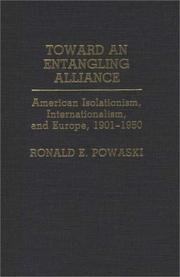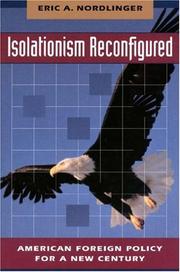| Listing 1 - 10 of 99 | << page >> |
Sort by
|
Book
Year: 1918 Publisher: New York George H. Doran Company
Abstract | Keywords | Export | Availability | Bookmark
 Loading...
Loading...Choose an application
- Reference Manager
- EndNote
- RefWorks (Direct export to RefWorks)
Book
ISBN: 3658349573 Year: 2021 Publisher: Wiesbaden : Springer Fachmedien Wiesbaden GmbH,
Abstract | Keywords | Export | Availability | Bookmark
 Loading...
Loading...Choose an application
- Reference Manager
- EndNote
- RefWorks (Direct export to RefWorks)
Marcus Matthias Keupp's book explores the concept of isolationism in the context of modern global challenges such as Brexit and lockdowns. The author argues against the notion of retreating into isolation, emphasizing the importance of open markets and interconnected networks over state seclusion and closed borders. Keupp presents a historical, legal, economic, and technical perspective to demonstrate the fragility of global achievements and the need for a global outlook. The book targets readers interested in international relations, economic policies, and global cooperation, offering insights into the potential future paths of our interconnected world.
Book
ISBN: 1400805732 1282752316 140081281X 9786612752315 1400821819 9781400821815 9781282752313 1400805740 9781400805747 9781400805730 9781400812813 Year: 1995 Publisher: Princeton, N.J. : Princeton University Press,
Abstract | Keywords | Export | Availability | Bookmark
 Loading...
Loading...Choose an application
- Reference Manager
- EndNote
- RefWorks (Direct export to RefWorks)
This iconoclastic and fundamental work, Eric Nordlinger's last, advocates a new variant of isolationism, a "national strategy" confining U.S. military actions largely to North America and to neighboring sea-and air- lanes but encouraging international activism and engagement in nonsecurity realms. In Nordlinger's view, disengaging from security commitments on distant shores would liberate the United States to use its resources and decision-making powers to act more effectively abroad in matters of economic policy and human rights. A national strategy would then become a powerful new method of encouraging international ideals of democracy, and isolationism would be freed of its previous associations with appeasement, weakness, economic protectionism, and self-serving nationalism. Nordlinger draws on the recent historical record to show that a national strategy would have lessened the perils of earlier decades, including those of the Cold War. While real dangers did exist during this period, engaged strategies, such as containment, too often exacerbated them. The United States could have effectively and far less expensively helped to deter Communist aggression in Europe and Asia by encouraging other nations to make larger investments in their own protection. Marshaling impressive empirical evidence in defense of a controversial position, this final work by a leading scholar of international affairs is essential reading for scholars, practitioners, and lay readers alike.
Book
ISBN: 1800432682 1800432704 9781800432703 9781800432680 1800432690 9781800432697 Year: 2021 Publisher: Bingley, England : Emerald Publishing Limited,
Abstract | Keywords | Export | Availability | Bookmark
 Loading...
Loading...Choose an application
- Reference Manager
- EndNote
- RefWorks (Direct export to RefWorks)

ISBN: 0313272743 Year: 1991 Publisher: New York (N.Y.) Greenwood
Abstract | Keywords | Export | Availability | Bookmark
 Loading...
Loading...Choose an application
- Reference Manager
- EndNote
- RefWorks (Direct export to RefWorks)
Isolationism --- History --- United States --- Foreign relations
Book
ISBN: 9780199393022 Year: 2020 Publisher: New York, NY : Oxford University Press,
Abstract | Keywords | Export | Availability | Bookmark
 Loading...
Loading...Choose an application
- Reference Manager
- EndNote
- RefWorks (Direct export to RefWorks)
"The United States is in the midst of a bruising debate about its role in the world. Not since the interwar era have Americans been so divided over the scope and nature of their engagement abroad. President Donald Trump's America First approach to foreign policy certainly amplified the controversy. His isolationist, unilateralist, protectionist, and anti-immigrant proclivities marked a sharp break with the brand of internationalism that the country had embraced since World War II. But Trump's election was a symptom as much as a cause of the nation's rethink of its approach to the world. Decades of war in the Middle East with little to show for it, rising inequality and the hollowing out of the nation's manufacturing sector, political paralysis over how to fix a dysfunctional immigration policy--these and other trends have been causing Americans to ask legitimate questions about whether U.S. grand strategy has been working to their benefit. Adding to the urgent and passionate nature of this conversation is China's rise and the threat it poses to the liberal international order that took shape during the era of the West's material and ideological dominance. Isolationism speaks directly to this unfolding debate over the future of the nation's engagement with the world. It does so primarily by looking back, by probing America's isolationist past. Although most Americans know little about it, the United States in fact has an impressive isolationist pedigree. In his Farewell Address of 1796, President George Washington set the young nation on a clear course: "It is our true policy to steer clear of permanent alliances with any portion of the foreign world." The isolationist impulse embraced by Washington and the other Founders guided the nation for much of its history prior to the Japanese attack on Pearl Harbor in 1941"--
Isolationism --- History. --- United States --- Foreign relations. --- USA--FOREIGN RELATIONS--HISTORY --- ISOLATIONISM--USA--HISTORY

ISBN: 0691043272 0691029210 1282752316 1400805732 1400805740 140081281X 1400821819 9786612752315 Year: 1995 Publisher: Princeton, N.J. Princeton University Press
Abstract | Keywords | Export | Availability | Bookmark
 Loading...
Loading...Choose an application
- Reference Manager
- EndNote
- RefWorks (Direct export to RefWorks)
Isolationism --- United States --- Foreign relations --- 1989-1993 --- Neutrality
Book
ISBN: 9781783963744 1783963743 9781783963423 1783963425 Year: 2018 Publisher: London Eliott and Thompson
Abstract | Keywords | Export | Availability | Bookmark
 Loading...
Loading...Choose an application
- Reference Manager
- EndNote
- RefWorks (Direct export to RefWorks)
Walls are going up. Nationalism and identity politics are on the rise once more. Thousands of miles of fences and barriers have been erected in the past ten years, and they are redefining our political landscape. ; There are many reasons why we erect walls, because we are divided in many ways: wealth, race, religion, politics. In Europe the ruptures of the past decade threaten not only European unity, but in some countries liberal democracy itself. In China, the Party's need to contain the divisions wrought by capitalism will define the nation's future. In the USA the rationale for the Mexican border wall taps into the fear that the USA will no longer be a white majority country in the course of this century.; Understanding what has divided us, past and present, is essential to understanding much of what's going on in the world today. Covering China; the USA; Israel and Palestine; the Middle East; the Indian Subcontinent; Africa; Europe and the UK, bestselling author Tim Marshall presents a gripping and unflinching analysis of the fault lines that will shape our world for years to come.
World politics --- Division (Philosophy) --- Nationalism --- Identity politics --- Isolationism
Book
ISBN: 1351394169 1315141604 1351394150 Year: 2018 Publisher: New York, : Routledge,
Abstract | Keywords | Export | Availability | Bookmark
 Loading...
Loading...Choose an application
- Reference Manager
- EndNote
- RefWorks (Direct export to RefWorks)
Populism. --- Protectionism. --- Isolationism. --- Right and left (Political science) --- Voting.
Book
ISBN: 9781324075202 1324075201 Year: 2024 Publisher: New York, NY W. W. Norton & Company, Inc.
Abstract | Keywords | Export | Availability | Bookmark
 Loading...
Loading...Choose an application
- Reference Manager
- EndNote
- RefWorks (Direct export to RefWorks)
"Examines how nationalism, rather than internationalism, came to ensnare world politics in the early twentieth century ... Rich with astonishing detail gleaned from Zahra's unparalleled archival research in five languages, Against the World is a poignant and thorough exhumation of the popular sources of resistance to globalization. With anti-globalism a major tenet of today's extremist agendas, Zahra's arrestingly clearsighted and wide-angled account is essential reading to grapple with our divided present"--
World politics --- Economic history --- Anti-globalization movement --- Nationalism --- Isolationism --- History
| Listing 1 - 10 of 99 | << page >> |
Sort by
|

 Search
Search Feedback
Feedback About UniCat
About UniCat  Help
Help News
News